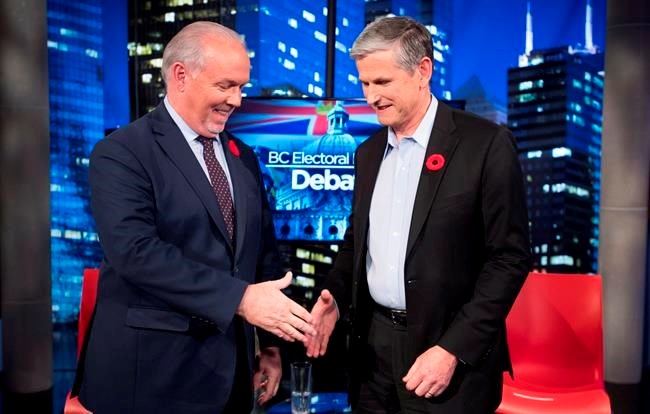Premier John Horgan and Opposition Leader Andrew Wilkinson alternately accused each other of being afraid of change or hiding details about what it involves during a televised debate Thursday night about the referendum on B.C.’s electoral system.
The mail-in ballot questions, now in the hands of 3.3 million registered voters, are about whether to change the voting system to one of three proportional representation models. The issue sparked numerous clashes between the two leaders. Horgan urged people to vote for change, saying it would transform the legislature into a cooperative, inclusive (bigger) forum and open up politics to a new group — the frustrated who now feel their votes are wasted.
Wilkinson, who repeatedly demanded details from Horgan about the changes, said the whole process is flawed and people are being left in the dark about how it will operate. He urged a “no” vote.
He said political parties should have been kept “100 miles away” from the process, but instead it is being run by the government and 23 details will be decided by an NDP-majority committee if the referendum passes. “He (Horgan) is the one who gets to fill in all the blanks.”
Wilkinson endorsed the idea of an independent citizens assembly, like the one that studied electoral reform in 2003, if voters opt for the status quo.
Horgan said Wilkinson, who defended the voting method now in use, is stuck on a system that worked in the 1800s and isn’t ready to move into the 21st century. “Let’s get modern, let’s get hip.”
Asked if proportional representation would increase the cost of government, Horgan said: “There will be more members in the legislature and that will mean there’s more diversity, as well. That means more inclusion.”
The MLA count, now 87, could increase to 95. depending on which of the three systems is selected by voters.
Wilkinson said proportional representation would lead to an increase in smaller parties, regionally or ethnically based, which would create unstable minority governments and bring about more frequent elections.
In his closing statement, Horgan echoed the late federal NDP leader Jack Layton and asked people to put fear to one side and look to hope.
Both leaders arrived at the debate carrying so much personal baggage it got in the way of any objective consideration of the advantages and drawbacks of changing the voting system.
The leaders are so invested in the implications for their parties there’s no room for analysis of what it would mean for the province.
Horgan needs the referendum to pass for two major short- and long-term reasons. The more immediate one is that his government could quite likely collapse if people opt for no change.
The three Green MLAa have gritted their teeth at times and hung together with the NDP minority to see the referendum through. But all bets would be off after a “no” vote. With dreams of an automatic dozen-member caucus under a proportional representation system dashed, they could easily void the agreement, probably because of the NDP’s support for building a liquefied natural gas plant.
Over the longer term, the NDP’s lacklustre election record — three wins, 13 losses over almost 60 years would compel any leader to want to change the rules. They’ve tried almost everything, but can only rarely overcome centre-right coalitions under the current system.
And Wilkinson’s political future is just as much on the line. Proportional representation is a big threat to the liberal-conservative coalition that the B.C. Liberals have kept together for 27 years.
It’s tailored to the advantage of fringe parties, so any conservative-minded group that gets a foothold in the house would have a running start at clawing away the B.C. Liberals’ right flank.
Plus, why would B.C. Liberals want to change the rules to a game they’ve won five times in a row, including (technically) the last time?
So anyone looking Thursday night for impartial, dispassionate analysis of what the referendum means to B.C. was tuned to the wrong channel.



